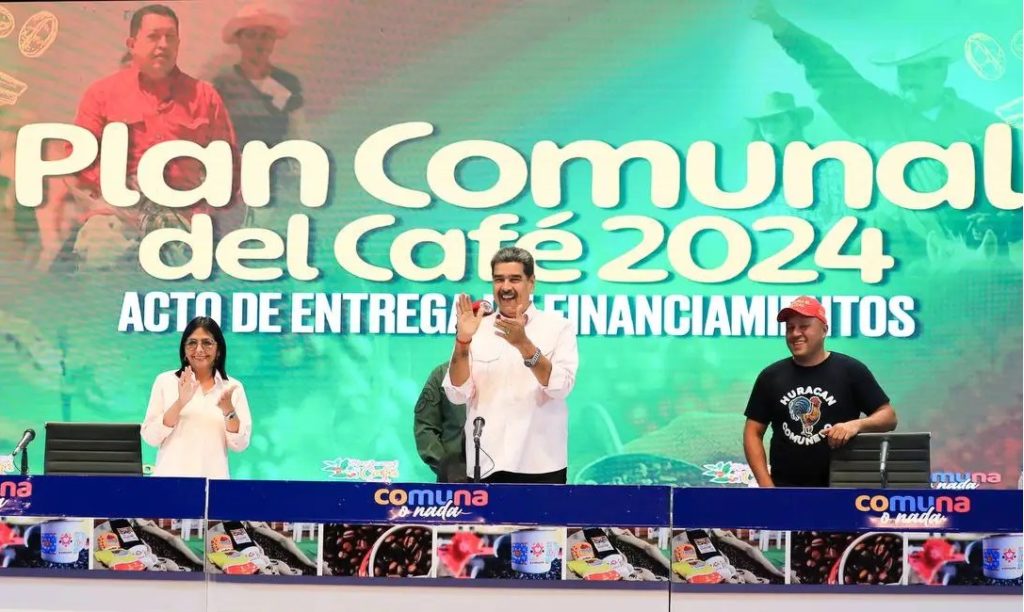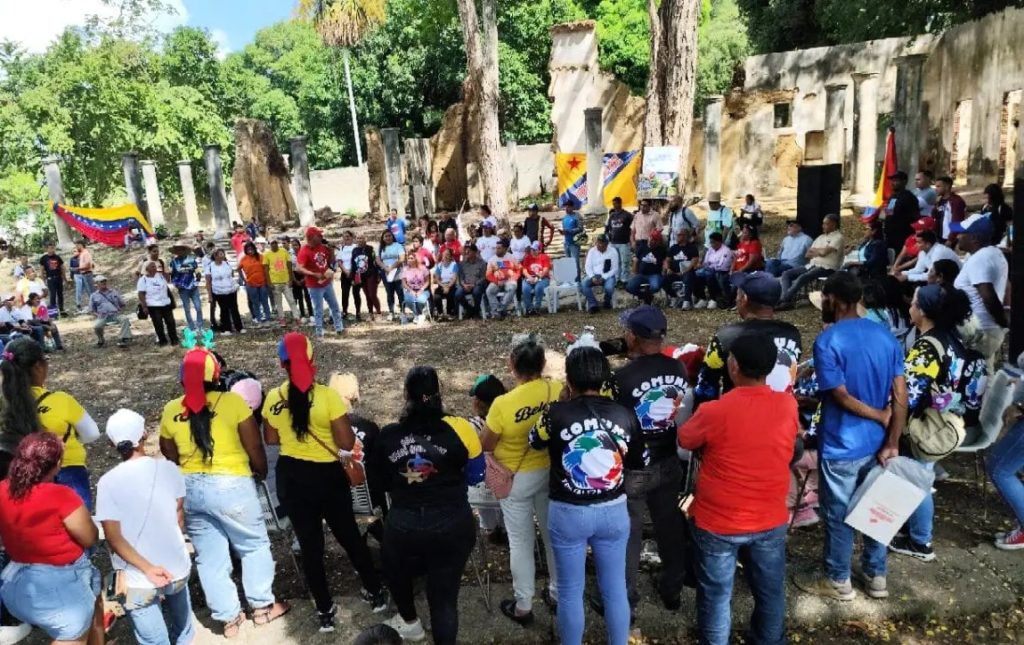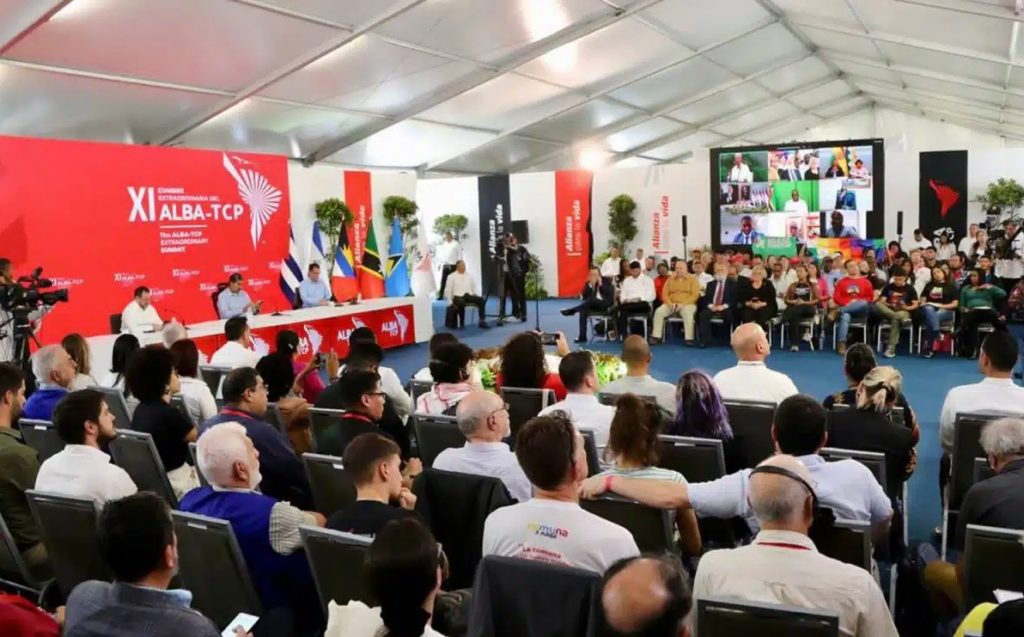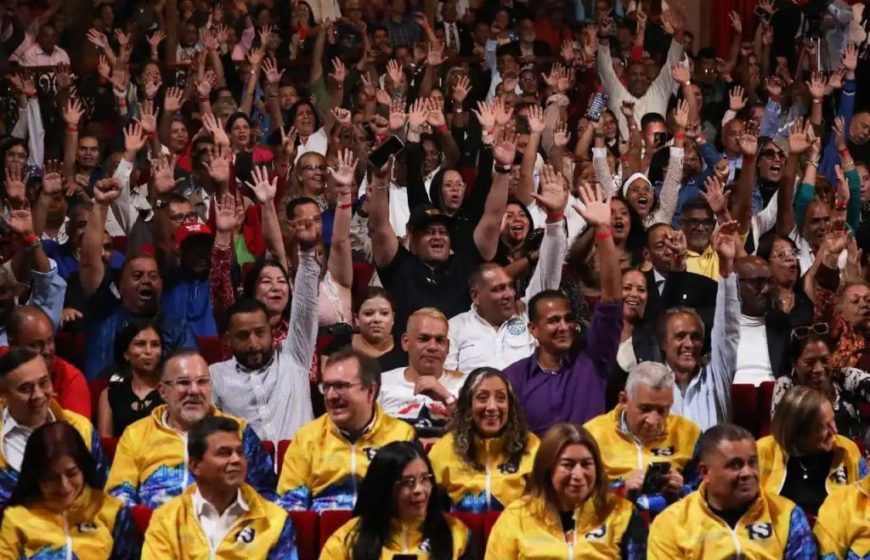Aware of the anachronism of a crumbling representative system riddled with corruption at all levels, Chavez and then Maduro have been patiently eroding the bases of the old world. They retook the Anticolonial Bolivarian Agenda, the Libro Azul, and the strategic reflection of the “Three Roots“[1] as early as in the 1990s. In the unwritten history of the thousands of freed slaves who crossed the Andes with Bolivar to liberate others, they found the footsteps to follow. The year 2024 is leaving the mark of new steps, and not of the smallest.
We start in June 2024 with the surprise appointment of a communard from the base, the farmer Angel Prado[2], as the new Minister of Municipalities and Social Movements. In Venezuela, the communes are popular self-governments counting from 1,000 to more than 50,000 persons, organized in urban neighbourhoods as well as in rural communities (2). “Watch that you don’t play the minister; don’t go become a VTV hotshot” Maduro told him (3). At ministerial meetings, Prado defines popular communication in terms of participation in assemblies where no one speaks for others and where everyone gives their own opinions and criticisms. In November, when Maduro and Prado met together with five thousand coffee producers, the president did not just speak to them of “credits” or “exports” but also of “the culture to be strengthened throughout the territories, and the new forms to be created“[3]. Turning to his Minister of Information, Maduro said: “We must build increasingly effective communication systems with all the forces of the base, all the municipal councils, the neighbours, all the communes, the municipal circuits.”

2025, the year of Communal Democracy
In December, the Bolivarian president surprised everyone again: “Mr. Ministers, you who are responsible for the preparation of the 2025 budget, we must achieve the objective that I set at the last meeting: our expenses and investments must reach 70% of direct transfers so that the municipal councils and municipalities are the ones that apply the nation’s budget“.
As early as April 2024, Maduro had accelerated the pace of nationwide elections where the dwellers of the municipalities choose their priority projects (4). Whether it is a socio-productive, cultural, health or infrastructural project, the State is obliged to finance it. The next “consulta popular” will take place on 26 January 2025, followed by five more in 2025. No better way to attack corruption. No better school of citizen power, where each is called upon to define their projects in preliminary assemblies, open to all, clear of any political sign. With an extraordinary fund of $600 million in addition to the $200 million already available to communities through the Federal Government Council, “the year 2025 will be the year of the Big Bang of territorial and communal investment in the needs of the population. It combines debate, consultation, direct democracy, and the direct allocation of state resources to municipal self-government,” Maduro insisted (5).
With 31 elections including 7 referendums in 24 years of revolution, Venezuela breaks all records in the number of consultations. The emergence of the communes means that no more than three months can pass without the National Electoral Centre rolling out polling stations throughout the country.

The communal model has also made it possible to create and test a new model of justice. On December 15, Venezuelans voted to elect 28,486 Municipal Justices of the Peace responsible for arbitrating conflicts between citizens (6). They deal with neighbourhood conflicts, corporate debts or illegal land occupation. If the parties do not reach an agreement, the cases are brought before the courts.
Another project: the University of the Communes as a centre for integrated training (political economy, agroecology, popular communication, etc.), especially for the community youth. “From 2025 to 2026, we should be able to reach at least 5,000 consolidated, organized, structured, legalized, trained municipal self-governments,” Maduro told the Minister of the Communes (Prado). As a way to think these policies out, the Bolivarian president constantly calls for citizen participation.
In November, the National Bolivarian Congress was the culmination of 101,587 popular assemblies throughout the country. Result: 580,000 proposals expressed by more than 3,600,000 men and women to feed the 2025-2030 government plan. “This is the freest, most egalitarian and most nurturing debate we have organized in 25 years to plan out the policies of the future,” Maduro explained. (7)
2025 is occasion for another assignment rising from the popular propositions. It will bring a major Constitutional Reform which, Maduro says, “will build a modern democracy based on the direct participation of citizens, the power of social movements, of the community. We are heading towards a great process of expanded democratization of Venezuelan society, of political, institutional, economic, social, cultural and educational life. Where you have a system that elects those with the most money to control TikTok, Instagram or radio and television, there is no democracy, but a farce, a theatre of the absurd. Venezuela does not want it, because its entire history is imbued with the idea and the longing for authentic democracy.” (8)
&.&.&.&.&.&.
Caracas: Rendez-vous of the the Global South Movements
On 10 and 11 September 2024, the first International Anti-Fascist Congress was founded. More than 1,200 participants from 95 countries discussed the fight against contemporary fascism, including the role of Silicon Valley social networks in the propagation of the ‘Muskian’ model of post-democracy[4] (9). In July [the Western powers] used the presidential elections in Venezuela as a testing bench to try their methods. This consisted in refusing the verdict of the polls by mixing [during the polls] far-right violence and digital blitzkrieg. Musk personally threatened Maduro through millions of bots on his “X” network[5], and the extreme right murdered 27 people, mostly Chavist activists. The French media participated in this umpteenth coup attempt against Venezuelan voters (10). The finality is to suppress the State and republican mediations, to install some sort of Middle Age under the digital governance of brutal regimes of which Trump, Milei or Bukele[6] are outposts.

In December, Nicolás Maduro hosted the ALBA-TCP[7] summit in Caracas (11), the Bolivarian Alliance for the Peoples of Our America – Trade Treaty for the Peoples. In this important stage of its development, this organisation celebrates its 20th anniversary concretely with the creation of a Council of Social Movements. This Council has elaborated an agenda of concrete and unitary actions which it proposes to the presidents of the ALBA-TCP for adoption, around topics like Unity and Internationalism; the Ideological and Cultural battle; the New Economy; the Defence of the Environment; the Democratization and the Construction of Popular Power; Popular Feminisms (12).
For the secretary general of Alba Movimientos, the Argentinian Laura Capote – the ALBA-TCP government and the Council of Social Movements share the same horizon: “We are not a committee that applauds the ALBA governments. We are the defenders of [..] revolutionary processes with contradictions and tensions, with things we like and others that we don’t, but such are our attainments as peoples. This one thing; but we are also preparing to build the foundations to develop and have power. We want power. We want socialism in our region.”
The document sent for projects implementation to the movements in 30 countries represented at the ALBA summit speaks first of all of the creation of temporary brigades. The idea originated from [Brazilian] Messilene Gorete[8], leader of the Landless Rural Workers’ Movement (MST). The project is based on the MST brigades as organized in various countries through ‘exchange’, ‘solidarity’ and ‘permanent’ brigades. In the exchange brigades, the aim is to share experience and knowledge between the movements of different countries around issues like agroecology and production, popular feminism and public policies. The solidarity brigades focus on people’s lives in aspects such as human rights and vigilance against violations of these rights. The permanent brigades aim at stimulating cooperation from a peoples’ angle. The goal is to strengthen the political organizations that already exist in countries such as Venezuela, Haiti and Zambia.
Journalist Florencia Agustina[9] proposed the creation of a school and press agency for popular movements. With the brigades, it would make it possible to break with the capitalist concentration of information. It could have correspondents in different countries and, in principle, establish a new theory of communication. The social movements of the ALBA point to the need for political training networks and the need to develop production strategies based on cooperativism in a perspective of solidarity and complementarity.
For its petrol as much as for its deeply democratising cooperation in the Global South, we see why the media empires have had to make a “dictatorship” out of Venezuela these last 20 year; and why the USA and the EU want to strangle its economy with their 936 sanctions. From under the depths of their racism, the Venezuelan right have understood one thing: So much emancipation, so many tools in the hands of a conscious, critical and long excluded population, can only make them look more anachronistic. Since 2006, the right-wing deputies (MPs) have systematically voted against the dozens of laws that transfer the power to popular organizations. But for those who despair of ever seeing democracy incarnate – in human form, etymologically speaking – Venezuela shows that dreaming is still allowed.
Thierry Deronne, Caracas, 2 January 2025.
The feature image is: Communal democracy in action.
The footnotes just below are those created by the author of the article. The footnotes further below are a contribution of the translator for an English speaking public.
Notes:
- In accordance with the Estrada doctrine of non-interference and respect for sovereignty and self-determination, Mexico has announced its respect for Venezuelan electoral institutions and refused to give in to the pressures exerted by Washington on its allies to refuse to recognize President Maduro. Like Colombia, the Mexican president will send her diplomatic representative to the inauguration of Nicolas Maduro on January 10, 2025. Faced with the indignation of part of the Latin American left for its position vis-à-vis Venezuela (and in particular the veto of a Brazilian diplomat on Venezuela’s entry into the BRICS), President Lula outlined a rectification after the validation of the results by the Supreme Court of Venezuela. Brazil’s main social movements have written to him twice asking him to clearly acknowledge Maduro’s victory. Finally, Brazil will also send its diplomatic representative to Maduro’s inauguration. Lula’s charismatic image must not obscure his difficulties. Former Labour Party MP Margarida Salomão, recently elected mayor, criticizes the centrism of her party: “it would be a tragedy for the PT to abandon its original programmatic commitments“. Analyzing Trump’s victory, Frei Betto, Lula’s former minister and responsible in his time for the “zero hunger” program, considers that “if the Brazilian left does not take Paulo Freire off the shelves, reopen popular education teams and schools, trains activists alongside the popular classes, does not assume ethics as a non-negotiable principle and does not replace the power project with the Brazil project, it will suffer its worst defeat in 2026 since the end of the dictatorship in 1985“. For its part, the Landless Movement openly criticizes the extreme slowness of agrarian reform. The contrast is striking with Venezuela, which has distributed 13 million hectares to small and medium-sized producers, and where President Maduro has just signed new agreements with the Brazilian Landless to create an agroecological cultivation area of 10,000 hectares in the south of the country.
- “Revolution in the revolution: Maduro appoints a communist leader minister of the Commons“https://venezuelainfos.wordpress.com/2024/06/11/revolution-dans-la-revolution-maduro-nomme-un-leader-communard-ministre-des-communes/
- VTV is the public television channel where ministers (in particular) explain their policies.
- “In Venezuela the communards continue to create the new State“, https://venezuelainfos.wordpress.com/2024/04/23/au-venezuela-les-communardes-continuent-a-creer-letat-nouveau/
- “Maduro approved the 2025 Budget Law“,https://ultimasnoticias.com.ve/noticias/politica/maduro-firmo-ejecutese-de-ley-de-presupuesto-2025/ and “Presidente Maduro instruas to allocate 70% of the national budget to Communes and Municipal Councils“,https://www.comunas.gob.ve/2024/10/21/presidente-maduro-instruye-destinar-70-del-presupuesto-nacional-a-comunas-y-consejos-comunales/
- “Venezuela proposes transformação da justiça a partir de juízes de paz nas comunas“, https://www.brasildefato.com.br/2024/12/17/venezuela-propose-transformacao-da-justica-a-partir-de-juizes-de-paz-nas-comunas
- “Hair to mayors and governors: It’s the moment of Popular Power“, https://ultimasnoticias.com.ve/noticias/politica/cabello-a-alcaldes-y-gobernadores-es-el-momento-del-poder-popular/
- “Venezuela is in peace, calm and safe of its destination and its path”: Maduro “,https://www.jornada.com.mx/noticia/2025/01/01/mundo/201cvenezuela-esta-en-paz-tranquila-y-segura-de-su-destino-y-su-camino201d-maduro-2739
- On this Congress: “Call for an anti-fascist and anti-imperialist international“,https://investigaction.net/appel-pour-une-internationale-antifasciste-et-anti-imperialiste/ and “Fascism returns: Caracas’ appeal to the peoples of the world“,https://investigaction.net/le-fascisme-revient-lappel-de-caracas-aux-peuples-du-monde /
- “How the French media prepare the violence of the extreme right in Venezuela“, https://venezuelainfos.wordpress.com/2024/06/20/comment-les-medias-francais-preparent-la-violence-de-lextreme-droite-au-venezuela/
- “Alba completa 20 anos mirando defesa do socialismo e novos desafios para articulação regional“, https://www.brasildefato.com.br/2024/12/30/alba-completa-20-anos-mirando-defesa-do-socialismo-e-novos-desafios-para-articulacao-regional
- “Cúpula da Alba celebra 20 años e discute propostas de articulação das esquerdas latino-americanas“, https://mst.org.br/2024/12/16/cupula-da-alba-celebra-20-anos-e-discute-propostas-de-articulacao-das-esquerdas-latino-americanas/
Translation Posadists Today.
URL of this article: https://venezuelainfos.wordpress.com/2025/01/02/a-rebours-des-post-democraties-de-musk-and-trump-nicolas-maduro-renforce-la-democratie-au-venezuela/
[1] Libro Azul is the title of a book by Hugo Chavez: http://www.consulvenevigo.es/subido/LIBRO%20AZUL%20DESCARGA.pdf – The Three Roots is based on the ideas of Simón Bolivar, Simón Rodriguez and Ezequiel Zamora. Chavez incorporated their ideas the “Three Roots of the Tree of the MBR-200” – https://en.wikipedia.org/wiki/Hugo_Chávez#:~:text=He%20was%20inspired%20by%20Simón,%22%20of%20the%20MBR%2D200. The MBR-200 is the name of a revolutionary wing in the capitalist army of Venezuela under Ppresident Caldera, circa 1982. MBR means Revolutionary Bolivarian Movement.
[2] Angel Prado takes over as Minister of Communes, 8 June 2024. https://venezuelanalysis.com/news/venezuela-maduro-appoints-el-maizals-angel-prado-minister-of-communes/
[3] The Maduro government discusses publicly the mechanism through which the producers’ retail price is calculated. Meanwhile, a government fund protects the producer from variations in the behaviour of commodities. https://en.ultimasnoticias.com.ve/news/economy/coffee-sector-agreed-on-steps-to-strengthen-production-of-the-sector/
[4] Post-democracy: By Colin Crouch’s definition: “A post-democratic society is one that continues to have and to use all the institutions of democracy, but in which these increasingly become a formal shell. The energy and innovative drive pass away from the democratic arena and into small circles of a politico-economic elite.” – Colin Crouch, a sociologist born 1944 in the UK, is a former professor at Warwick University and at LSE.
[5] Bots are automated software applications that can be used to perform repetitive tasks on multiple media networks. They can be programmed to imitate human behaviour and spread manipulated news to alarm, to defame, to influence people, to start fights, etc.
[6] Milei, president of Argentina. Nayib Bukele, president of El Salvador.
[7] ALBA: founded 14 December 2004 in Havana under the leadership of the ‘Comandantes’ Hugo Chávez and Fidel Castro, ALBA has 10 member States: Venezuela, Cuba, Nicaragua, Bolivia, Dominica, Grenada, Antigua and Barbuda, Saint Lucia, Saint Kitts and Nevis, and Saint Vincent & Grenadines. Countries like Surinam wants to join. To date, the observer States have been Haiti, Syria & Iran. https://www.albatcp.org/en/2024/12/14/a-hug-and-20-years-of-integration-president-of-venezuela-opened-24th-alba-tcp-summit/
[8] Messilene Gorete – https://mst.org.br/2022/05/27/solidarity-a-conversation-with-messilene-gorete/
[9] Florencia Agustina: https://www.instagram.com/florenciaabregu/p/C_OxjmjSlug/?img_index=1
















